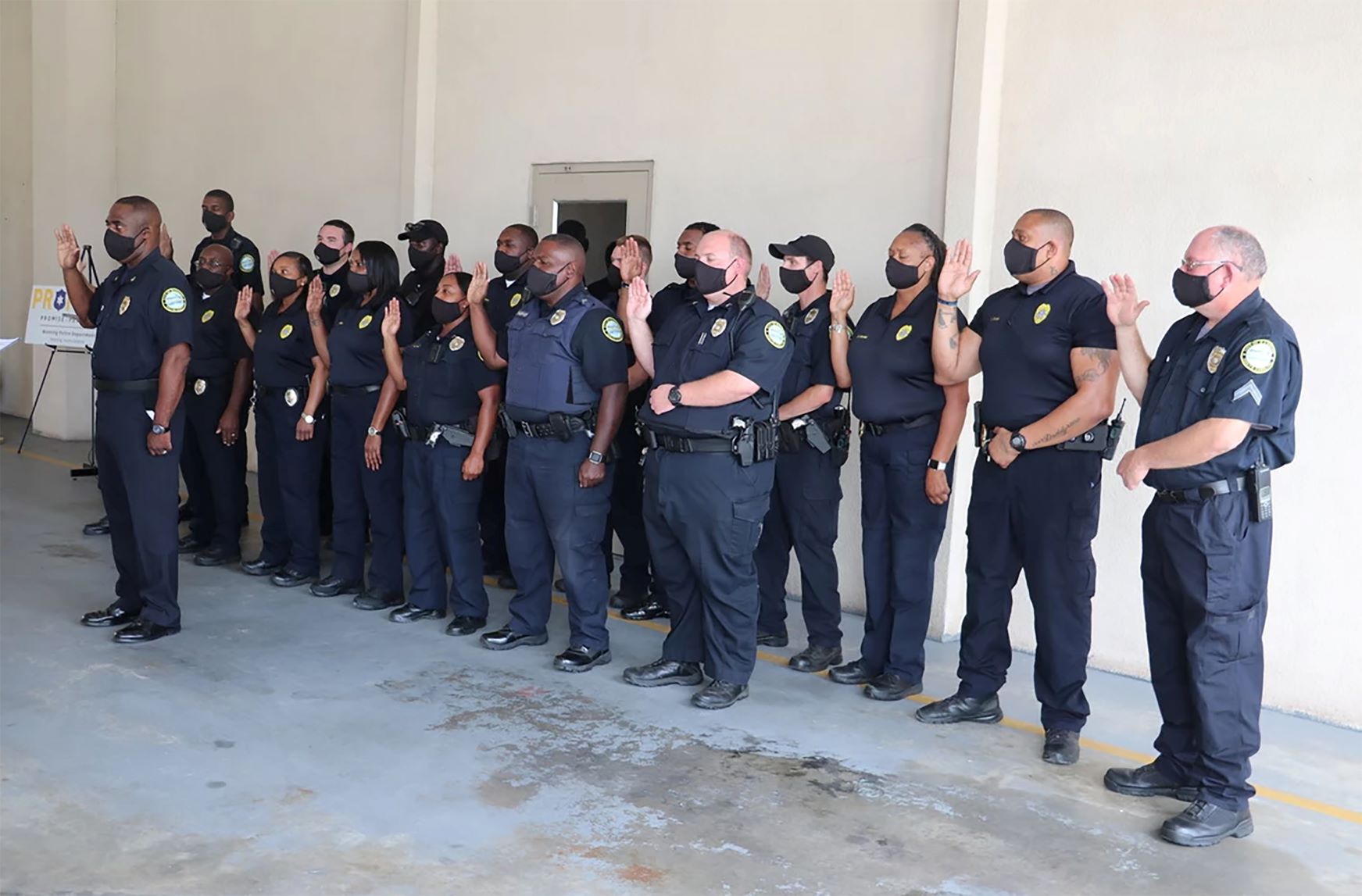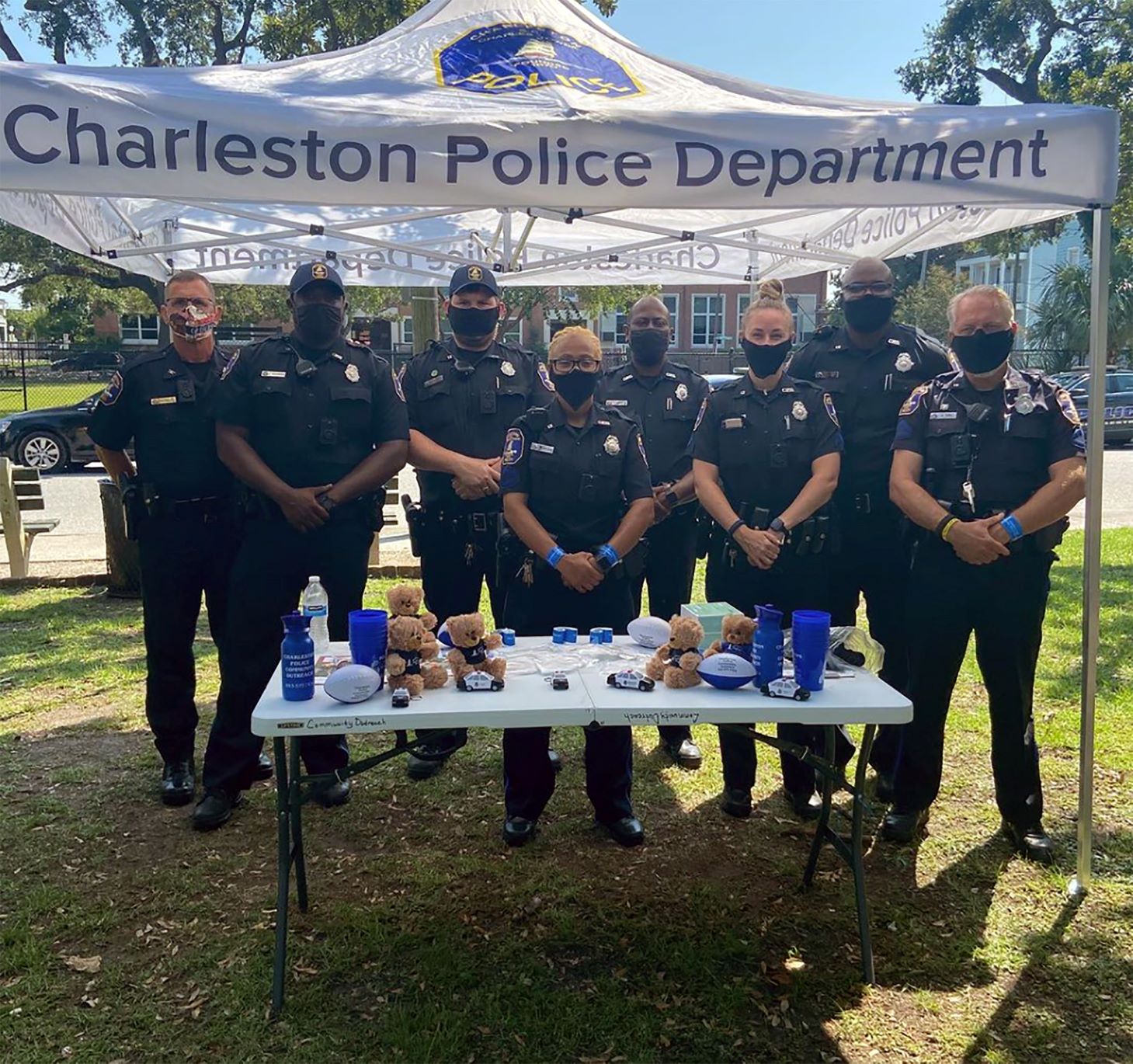As protests erupted around the country last summer following the death of George Floyd while in police custody, South Carolina municipalities took steps to improve communication, change policies and increase transparency between police departments and the public.
After the release of a video showing a Minneapolis police officer kneeling on Floyd’s neck for almost nine minutes while other officers at the scene did nothing to stop him, the Bluffton Police Department decided to take a formal step to ensure nothing similar happened in the Beaufort County town. The department added a duty-to-intervene policy, requiring police officers to step in to stop fellow officers who were using excessive force.
The Bluffton policy also requires on- or off-duty officers who see or hear about inappropriate use of force by another officer to report it to a supervisor or the internal affairs office. Capt. Donald Chandler said Bluffton officers have always had the responsibility to intervene, but codifying that policy reinforces that belief.
“We always believed that duty to intervene was practiced, but realized that it was not actually memorialized in our policies,” said Chandler, who is the department’s support division commander. “We reviewed our policy and found that it needed to be added in order to truly hold our officers accountable for their actions or their inactions.”
Chandler said the change in policy was well received, both by members of the department and the Bluffton community.
“The biggest change so far is that it opened up dialogue between our officers and with our community. It allowed us to have conversations and emphasize what our beliefs are and what we stand for,” he said.
Manning is another city that has taken steps to show its commitment to partnering with residents. In June, Manning police officers took the I Promise Pledge, making a commitment to citizens, dedicating themselves to doing the right thing and promising to report any wrong doing of officers that could jeopardize the relationship the department has worked to build with the community.
“I felt it was important to commit to this pledge to show that we are trying to bridge the gap with the community. We want to be transparent in an effort to build any trust that may have been lost as of a result of the issues going on around the country,” Police Chief Keith Grice said.

Officers of the Manning Police Department take the I Promise Pledge.
Photo: City of Manning.
In taking the pledge, all Manning policer officers promise
- to serve the community with dignity and respect, treating all citizens equally, regardless of race or socioeconomic backgrounds;
- to do everything to promote a peaceful outcome, using force only when there is no other option;
- to not let the negative actions of a few cloud an officer’s judgment about what is right; and
- to do everything in the officer’s power to promote peace, knowing that an officers’ actions impact everyone.
The final line says, “I promise to continue leading with a servant’s heart, so that my badge is one of honor.”
The I Promise Pledge initiative was created by Mayor Julia Nelson and Jeff Black, a former Manning resident. The two grew up and attended school together, and 50 years later the friends wanted to demonstrate the importance of banding together and building trust.
Grice said Manning’s police officers gathered to discuss the meaning of the pledge, while a policy also has been established for the mandatory intervention and reporting of law enforcement misconduct or excessive force. The city created a website, www.promise4peace.org, to spread the word about the initiative.
While many efforts gained momentum last summer, cities have been working on improving the relationship between police and residents for years. In Charleston, steps have been taken to open the dialogue with residents throughout the city and help residents understand the workings of the police department.
“Even before the unrest in the country, we saw a need for communication and to build on our outreach and communications. Since the unrest, we’ve even gotten better,” said Capt. Dustin Thompson, a Charleston police veteran who is the division commander overseeing the city’s community-oriented policing.
While the city had long had a community outreach team, in 2019 it created an entire division committed to community-oriented policing. That division includes a community outreach patrol team, a traffic division and a Citizens Police Advisory Council.

The Charleston Police Department’s community outreach team works for visibility and positive interactions, using events, impromptu basketball games and even setting up its mobile
command post RV for tours. Photo: City of Charleston.
A racial bias audit of the department completed in 2019 brought many issues to the forefront, including the revelation that some officers thought building community partnerships was the sole responsibility of the outreach team. The city has set out to change that mindset, with the idea that all members of the police department are responsible for relationship building.
While reducing crime is the overall goal of any department, Charleston also is committed to pushing and tracking problem solving efforts. For example, the city tracks things such as when an officer is flagged down by a resident who is upset that residential water has been turned off.
“We track whether the officer took the time to help that person. It’s important to let the officer know it’s okay to spend the time and solve that little problem for that citizen. If you can solve that problem, that person might be a witness you want. Or the next generation may see police in a different light. These are the seeds we are planting,” Thompson said.
After the community was rocked by the shooting deaths at Emanuel AME Church in 2015, the city created the Illumination Project to further strengthen relationships between the residents and police. That project eventually led to forming the Citizen Police Advisory Council. The 18-member council includes representatives appointed from each of the 12 city council districts, along with four appointed by the mayor and two high school seniors.
“I want them to know who to contact at the police department. I want them to know what’s going on inside and take it back to their districts, to go to community meetings, meet people, bring new ideas and ask questions,” Thompson said.
Another responsibility of the council is to take a “deep-dive look” inside the police department, often through setting up subcommittees to look as specific issues. There are active traffic stop, policy and communications subcommittees, offering advisory council members the chance to learn how officers are trained for traffic stops and other issues.
“They’ll do their homework and report back to us. We need those ideas coming in. They may see something different than we do. And those one or two things may be key changes that we don’t see because we’ve been doing it for so long,” he said.
The common goal of all these outreach efforts? Build trust and relationships before difficult events create stress in a community.
